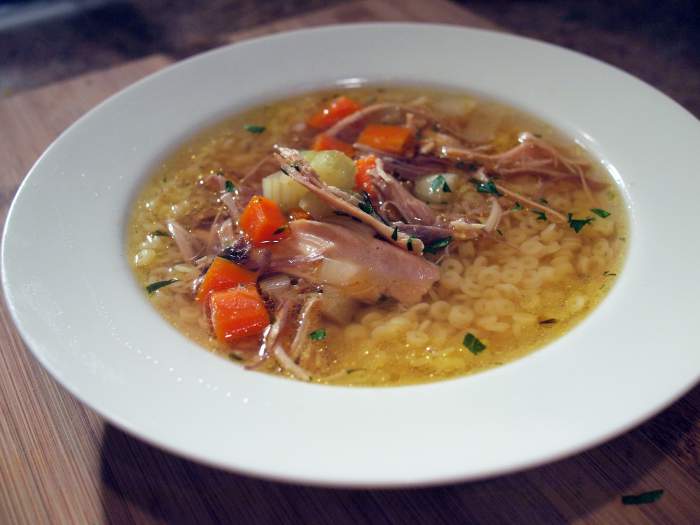After the debauchery that is Winter Carnival and the exhausting weekends of Igloofest, many of McGill’s finest have begun to suffer from the effects of the common cold. Although cures like sage extract, licorice tea, and kissing a mule’s muzzle—a bit of creative flare on the part of the Romans— fluctuate in popularity, the most established remedies call for rest, hydration, and chicken soup. While we’ve heard plenty of anecdotal evidence for chicken soup’s efficacy, what does the science behind the broth have to say?
There are a number of ways chicken soup may alleviate a cold. Dr. Stephen Rennard of the University of Nebraska, found that his wife’s family recipe for chicken noodle soup—handed down from her Lithuanian grandmother—inhibited the action of neutrophils, the white blood cells of one’s immune system that defend against infection. Neutrophils, when they attack bacteria, cause inflammation. While these white blood cells are necessary to fight infection, too much inflammation can cause many uncomfortable symptoms. Dr. Renner postulated that by suppressing some activity of these white blood cells, chicken noodle soup may reduce cold symptoms, such as sore throats.
Chicken soup’s palliative properties may also come from the chicken itself. The flavor of chicken meat comes from the amino acid cysteine; and a chemically similar substance, N-acetylcysteine, is frequently used in cold medication to thin out mucus in the bronchial tract. A team of researchers at Miami’s Mount Sinai Hospital investigated the possibility of cysteine possessing similar properties to N-acetylcysteine by measuring the speed of cold patients’ nasal mucous flow (i.e., snot-speed) after drinking cold water, hot water, or chicken soup. Those drinking chicken soup had substantially runnier noses than patients drinking cold water, and slightly runnier noses than those who had hot water. These results—not particularly impressive in the first place—lasted a whole half hour before nasal drip speed returned to baseline, resuming congestion.
While chicken soup may not cure a cold, it’s likely to help by replenishing the electrolytes we lose while sick. Vegetables, and parsnips in particular, contain the necessary potassium to sodium ratio that cells require; think of it as hot, hearty Gatorade. Additionally, components such as peppercorns and chili peppers contain substances resembling guaifenesin, frequently present in medication which increases the production of mucous and lubricates the irritated respiratory tract.
The placebo effect is also likely to be involved in the healing properties of chicken soup. Since it’s often touted as an appropriate remedy by both clinicians and the public at large, it’s probable that we hold strong expectations about chicken soup’s benefits. These preconceptions help us feel better after consuming a hot bowl of soup.
While the above findings may seem somewhat compelling, all of the available evidence is indirect. To date, no amount of research has conclusively linked chicken soup to shorter colds. But while it may not cure your cold, it certainly beats a mule’s muzzle.








